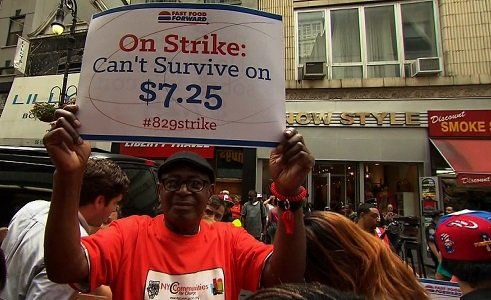In his January 1964 State of the Union address, President Lyndon B. Johnson declared an “unconditional war on poverty,” setting into motion a series of policy changes and new programs that cut poverty in half (from 22 to 11 percent) by 1975 and kept it well below 20 percent in the years since. Johnson’s programs continue to save millions of Americans from the worst effects of poverty each year. According to the Center on Budget and Policy Priorities, they lifted 41 million Americans out of poverty in 2012 alone.
Despite this progress, 50 million Americans are still living in poverty today, and millions more live with the constant fear bred by economic insecurity. Instead of working together to solve this problem, some politicians have used this opportunity to exploit Americans in poverty to justify unprecedented attacks on War on Poverty programs like SNAP, Head Start, and tax credits for low-income filers. With economic mobility continuing to stagnate, the future looks increasingly bleak for low-income Americans unless we work now to create economic opportunity and build better, stronger ladders out of poverty.
The good news is that there are concrete steps Congress can take this year to change the story for Americans living in poverty. In the short-term, raising the federal minimum wage is a no-brainer: like President Obama said in his recent State of the Union speech, “no one who works full time should ever have to raise a family in poverty.” All Americans should be compensated fairly for their hard work, and raising the minimum wage is the first step to ease the burden on low-income Americans.
Right now, Americans see their public benefits vanish the moment they earn a hard-won increase in income. As a result, we have created a “cliff effect” that makes escaping poverty nearly impossible. When a single mother working to make ends meet can provide much more for her family making $7.25/hour than at $15/hour because her eligibility for federal assistance disappears, there is no longer an incentive for her to escape poverty. Why should she try to earn a better wage when it means she’ll be putting less food on the table for her kids? This is just one example of the impossible choices facing low-income Americans every day. Raising the minimum wage alone is not enough to restore economic opportunity for Americans in poverty, but we can fix the cliff effect by changing its slope— gradually reducing public benefits in proportion to a family’s financial success.
Finally, the key to winning the War on Poverty once and for all is to increase economic stability for all Americans by creating opportunities to build wealth. Data released by CFED last month shows the percentage of households in the United States who lack the savings needed to weather a financial emergency like a job loss (called “asset poverty”) is 25 percent. That number rises to an alarming 44 percent if you only count “liquid” assets (assets that can be converted to cash fairly quickly). If you think poverty is someone else’s problem, think again: that means nearly half of us are one bad day away from falling into poverty at any given time. The Financial Security Credit, which uses the tax code to create matched savings accounts for low-income taxpayers, would help struggling families by allowing individuals to create personal safety nets to fall back on instead of having to rely on public benefits. The Financial Security Credit is a simple and relatively inexpensive solution that could prevent millions of Americans from slipping further into poverty while giving them the tools they need to build a better future.
You see, the solutions to poverty already exist; it’s just a matter of generating the political will to put them into place. As we reflect on the 50th anniversary of the War on Poverty, it’s time to take the lessons we’ve learned in stride as we move toward the goal of eliminating poverty for good. I call on Maryland’s elected officials to follow World Bank President Jim Kim’s call to end poverty by 2030 and renew our commitment to the future of America by building newer and stronger ladders out of poverty.
Jami-Lin Williams is resident of Charles Village in North Baltimore.
